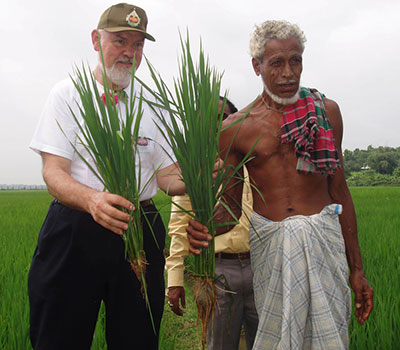System of Rice Intensification earns food security prize
By Lucy Fisher

The System of Rice Intensification (SRI), an agro-ecological method of growing rice that enhances crop yields and is resilient to the adverse effects of climate change, has been awarded the international Olam Prize for Innovation in Food Security. SRI is being recognized for its impact on the availability, affordability, accessibility and adequacy of food.
Norman Uphoff, professor emeritus of government and former director of the Cornell International Institute for Food, Agriculture and Development (CIIFAD), who has been working with SRI for over 20 years, accepted the prize during the third Global Science Conference on Climate Smart Agriculture March 16 in Montpellier, France. The Olam Prize provides $50,000 to support further SRI research.
“The main factors that explain the impacts of SRI management are the development of larger, more effective root systems and the promotion of greater abundance and diversity of beneficial soil organisms, which are factors outside the Green Revolution paradigm,” says Uphoff. He noted that SRI concepts and methodologies are being extended to crops such as wheat, millet and sugarcane under the broader System of Crop Intensification.
Uphoff first learned about SRI in Madagascar in 1993 while serving as director of CIIFAD. Farmers there were getting paddy rice yields of 2 tons per hectare from their very poor soils with conventional methods. Using SRI methods, farmers averaged 8 tons. In 1997, after three years of such results, Uphoff began working with researchers in Madagascar and other countries to develop scientific explanations for this unexpected productivity and to get the methods evaluated elsewhere and, if successful, adopted.
SRI methods have been shown to increase crop yields by 20 to 50 percent – often as much as 100 percent and more – with significant reductions in water requirements and seed. SRI began spreading globally after 2000, in large part due to Uphoff’s initiatives and efforts, as the Olam Prize recognizes. The effectiveness of SRI methods has now been demonstrated in more than 50 countries.
In 2010, a gift from Jim Carrey’s Better U Foundation supported establishment of the SRI International Network and Resources Center (SRI-Rice) at Cornell within CIIFAD. The program now operates within International Programs of the College of Agriculture and Life Sciences. Uphoff serves as a senior adviser for the SRI team, which promotes knowledge and advances research on SRI and SCI as freely and widely as possible.
The SRI-Rice website gives extensive information on the origins, practices, impacts and research evaluations of SRI. SRI-Rice provides online access to global SRI knowledge resources, guidance for researchers, practitioners and farmers, and technical support to a World Bank-funded program to improve and scale up SRI in 13 West African countries.
Global agribusiness Olam International partnered with the Agropolis Fondation to launch the Olam Prize for Innovation in Food Security in celebration of its 25th anniversary to address global food security through agricultural innovation and the development of sustainable supply chains.
Lucy Fisher is the communications director for SRI-Rice.
Media Contact
Get Cornell news delivered right to your inbox.
Subscribe